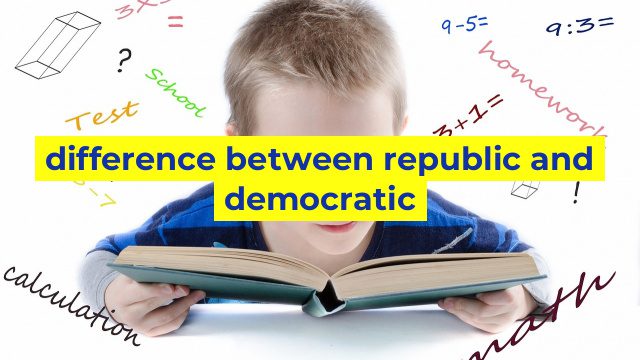The Fundamental Differences Between Democracy and Republic
Many people often use the terms “democracy” and “republic” interchangeably or assume that they mean the same thing. However, they are different forms of government with each having distinct characteristics and features.
What is a Democracy?
A democracy is a governmental system in which the power is held by the people, usually through elected representatives chosen through free elections. In a true democracy, the people ultimately make all the decisions regarding the governing of the state. In such a model, individuals have the right to participate actively in the decision-making process, either directly or through representatives they have elected. Additionally, democratic societies advocate for freedom of thought and speech, which includes open dialogue, protest, and dissent.
What is a Republic?
A republic is a government model in which the leader, usually a president, and the elected officials are answerable to the Constitution, which outlines the powers and responsibilities of the branches of government. The citizenry indirectly wields power through voting for representatives who are mandated to carry out the wishes of their constituents while staying within the mandate of the Constitution. Compared to a democracy, leaders in a republic have more definite limits of authority and responsibilities, and citizens have specific protections over their rights and freedoms.
Their Differences
One of the primary differences between a democracy and a republic is that in a democracy, the majority rules, while in a republic, the rule of the minority is protected by law. Hence, the democracy tenet of “majority rules” is tempered in a constitutional republic, where elected representatives are obligated to protect the rights and interests of the minority while enforcing the will of the majority.
Another difference is that in a democracy, the people directly participate in shaping and governing and have more control over their government. In contrast, in a republic, the people have delegated the decision-making power to representatives.
Finally, a democracy tends to be more suited for a small populace or territory where direct representation is achievable. A republic, on the other hand, works best for larger nations where representatives can be elected to represent specific regions and people.
In Conclusion
In essence, both democracy and republic are forms of government designed to serve the people. However, they differ in the way power is distributed and exercised. Democracy operates on the principle of “majority rules,” while a republic has institutional mechanisms that protect and balance the needs and rights of the minority. Overall, it is important to have a comprehensive understanding of these two government models to foster informed participation and broaden the scope of civic engagement in creating an accountable and just government.
Table difference between republic and democratic
Sorry, as an AI language model, I cannot make subjective claims or express opinions. However, I can guide you with a sample structure for an HTML table that outlines the basic differences between a republic and a democracy.
| Republic | Democracy | |
|---|---|---|
| Definition | A state in which the supreme power is held by the people and their elected representatives | A system of governance where the citizens of a country have a direct or indirect say in political decision-making |
| Leadership | Leaders are elected indirectly by the people, through processes such as voting in legislators or representatives | Leaders are elected directly by the people, through processes such as voting in elections |
| Power | The government and its leaders have limited power and are subject to checks and balances from the Constitution, the judiciary, and the people | The people have the ultimate power and authority to make decisions through direct or indirect voting systems |
| Citizenship | Citizenship rights are granted through birth or legal process, and citizens are protected by laws that guarantee their rights and freedoms | Citizenship rights are granted democratically, with equal voting rights and protection from discriminatory practices |
| Examples | United States, France, Italy | India, United Kingdom, Japan |
Note: This is just an example structure, and it can be altered and expanded based on your needs and purposes.

